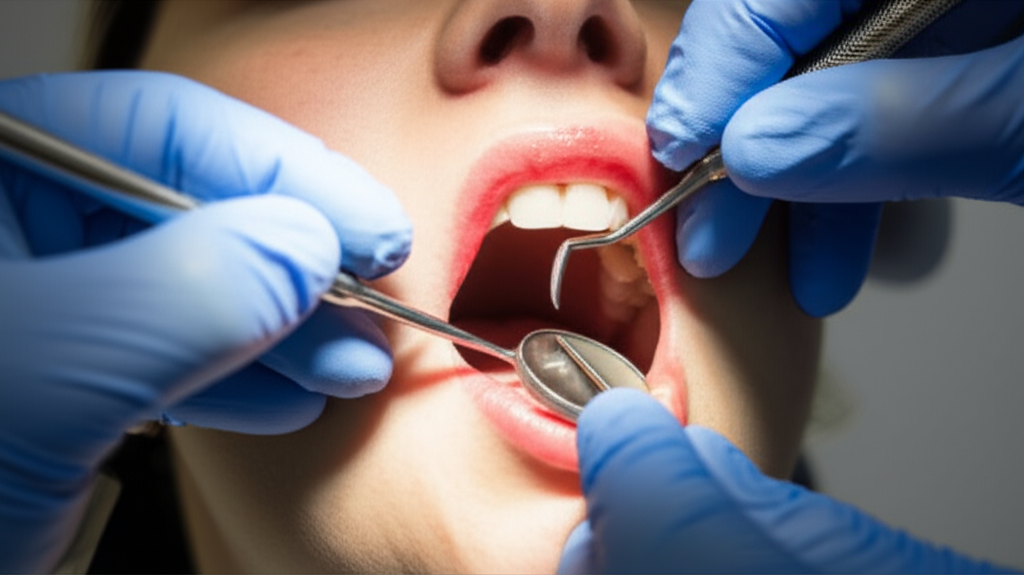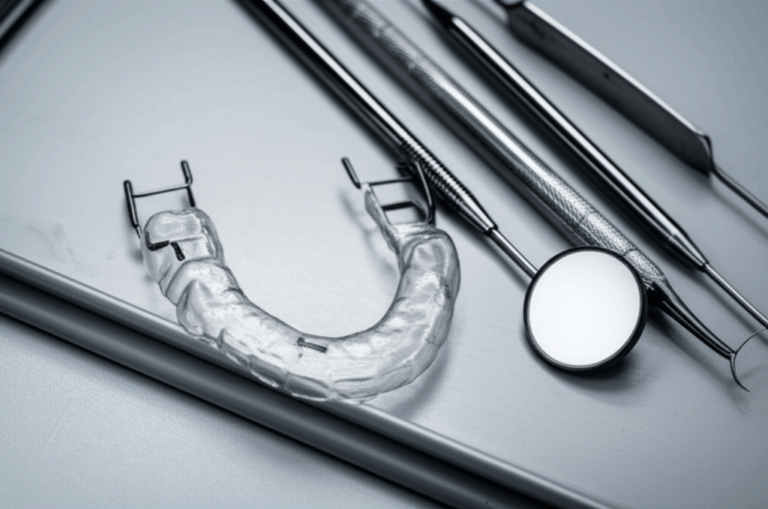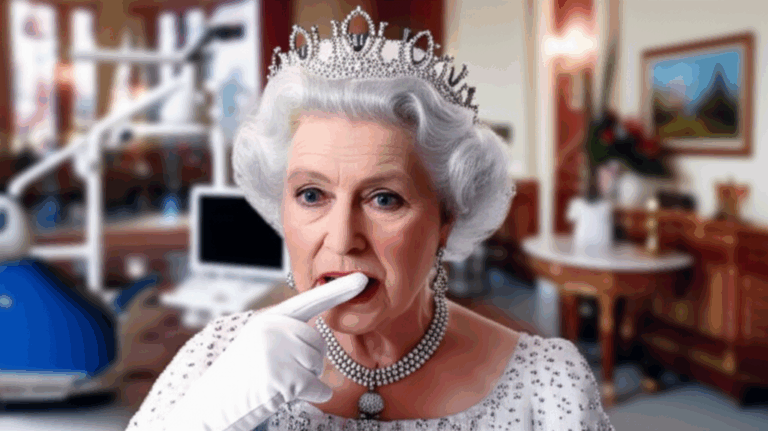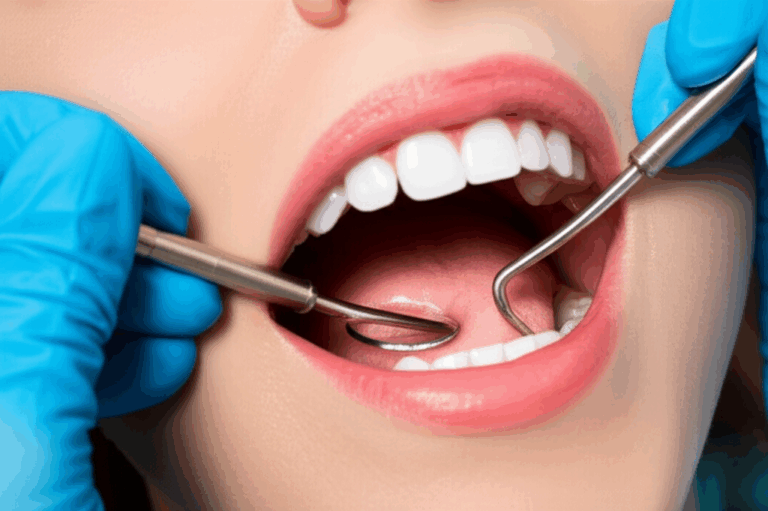
Can a General Dentist Do a Surgical Extraction? What You Need to Know
Short Summary:
If your dentist said a tooth needs to come out and it sounds like a tough job, you might wonder, “Do I need a specialist, or can my usual dentist do it?” This article is for you. We’ll explain what a simple or surgical extraction means, when a general dentist can do it, when you might see a specialist, and how to feel sure about your next dental visit. Let’s make tooth talk easy!
Table of Contents
What’s the Difference Between Simple and Surgical Extraction?
Let’s clear things up. Dentists pull teeth a lot, but not every tooth pull is the same.
Simple Extraction:
Think about a loose baby tooth or a tooth you can see above the gum and it’s ready to come out. That’s a simple extraction. Your dentist grabs it with a tool and wiggles it out. This works for teeth that stick up clearly and aren’t broken under the gum.
Surgical Extraction:
Now for the harder stuff. If the tooth broke at the gum, is stuck deep inside (like a tough wisdom tooth), or never poked out, it takes surgery to get it out. Surgical extraction means the dentist might cut into your gum, move some bone, or break the tooth apart to get it out safely.
Why Does This Matter?
Knowing which kind of extraction you need helps pick who should do it. Some general dentists can do these tricky ones, but sometimes you’ll need an oral surgeon. We’ll talk about that soon.
What Types of Extractions Can General Dentists Do?
You might be surprised at how much your regular dentist can handle. They learn a lot in dental school and keep training all the time.
Extractions General Dentists Usually Do:
- Simple Extractions: Loose or rotten teeth you can see in your mouth.
- Surgical Extractions: Some general dentists know how to take out teeth broken under the gum, small impactions, and roots left from old extractions.
If your case isn’t too hard, your dentist might be able to do it in their office. Many have training and tools for some surgical cases—as long as it’s not close to nerves or sinuses.
When They Might Send You to Someone Else:
If the tooth is deep, broken into a lot of pieces, or there’s a bad infection, you’ll hear, “We should let a specialist handle this.” It’s all about keeping you safe and comfortable.
Is It Legal for General Dentists to Do Surgical Extractions?
Lots of people ask: Can my family dentist really do this? Yes—most general dentists are allowed to do surgical extractions if they have the right training. Dentists are licensed, and the state keeps track to make sure they’re doing things right.
Keeping Skills Fresh
Dentists go to classes, hands-on training, and sometimes get special papers. These help them keep up with new ways to get teeth out, control pain, and watch for safety. If the dentist feels ready—and the tooth isn’t too tough—they can do many surgical extractions.
Knowing Their Own Limits
Dentists take their job seriously. If your case is too tricky, they’ll tell you and suggest a specialist.
When Will A General Dentist Do a Surgical Extraction?
Now for the details. Your dentist might do a surgical extraction if:
- The tooth is partly covered by gum (like a wisdom tooth halfway out).
- The tooth is broken, but not really deep or near nerves.
- There’s a root left from a past extraction.
Dentists decide by looking at your X-rays, health, and how tough the case looks. If things aren’t too risky, a lot of dentists will go ahead.
Things They Look At:
- How Deep and Which Way the Tooth Points: Deep teeth are harder.
- Where the Tooth Is: Near nerves or sinuses? That’s risky.
- Your Health: People with bleeding problems, weak immune systems, or heart issues are safer with a specialist.
- What Kind of Numbing You Need: If numbing shots aren’t enough, you might need stronger sedation. Not all dentists can offer this.
Some dentists only do the extractions they do a lot. If they haven’t done one like yours, that’s when they’ll send you to an oral surgeon.
When Should You See an Oral Surgeon Instead?
Oral surgeons are dental surgery experts. They go to dental school and learn for 4–6 more years about surgery, special sleep medicines, and how to deal with hard cases.
When You Need a Specialist:
- Really Deep Wisdom Teeth: Especially if they’re near nerves or sinuses.
- Lots of Tough Extractions: If you need more than one hard tooth out.
- Special Medical Needs: If you’re on blood thinners, have bad health, or special needs, an oral surgeon is best.
- Bone or Jaw Problems: If they have to cut bone or there’s a lump or cyst.
- IV Sedation or Being Put to Sleep Needed: Specialists can do this safely.
Seeing a specialist just means you’re getting the best help for your case!
What Happens During a Surgical Extraction?
Wondering what will happen? Here’s what to expect, step by step.
Step 1: Before the Procedure
You’ll have a consultation where your dentist looks, takes X-rays (maybe 3D or panoramic), and goes over your health. They’ll explain things and answer your questions. You’ll sign a form saying you understand what will happen.
Step 2: Numbing and Sedation
Most often, you’ll get a numbing shot in your mouth. You’ll be awake, but the tooth and gum won’t feel anything. If you’re really nervous, you might get nitrous oxide (“laughing gas”), a relaxing pill, or, with a specialist, a medicine through an IV.
Step 3: The Extraction
- The dentist makes a small cut in your gum.
- Maybe they’ll take out some bone to see the tooth.
- Sometimes the tooth is broken in pieces (sectioned).
- The dentist takes out the pieces, cleans the spot, and might put in a stitch.
And there you go—the tooth is out!
How Does It Feel—Is It Painful?
A lot of people worry about pain. It’s normal. The good news is with today’s numbing and careful dentists, you’ll feel pressure but not sharp pain during the work.
During the Extraction
Your mouth is numb. You’ll feel pushing or pulling, maybe hear crunches, and need to keep your mouth open. But real pain should be almost nothing. If something hurts, tell your dentist! They can stop and check.
After the Extraction
When the numb feeling wears off, you might be sore. It’s normal to have some swelling or a bruise. Your dentist will tell you how to manage any pain—over-the-counter pills or a prescription if you need it.
What’s Recovery Like After a Surgical Extraction?
Most people get back to their normal day in a couple days, but full healing can take up to two weeks. Your dentist will give you aftercare rules that are important.
Tips for Easier Recovery:
- Rest: Take it easy, no tough sports or heavy work right away.
- Ice: Helps with swelling.
- Eat soft foods: Like soup, pudding, mashed potatoes, and so on.
- Care for your mouth: Rinse gently, don’t spit hard.
- Watch for trouble: If you bleed a lot, get more pain, or see pus, call the dentist. Watch for dry socket, which happens if your blood clot falls out too soon.
Doing these things helps you heal fast. And if you need a new tooth, your dentist might tell you about options from a dental ceramics lab or even a digital dental lab.
What’s the Cost—And Will My Insurance Pay?
Let’s talk about money. Simple extractions cost less than surgical ones. Don’t worry—many insurance plans help pay for tooth removals you need.
Typical Price Ranges
| Provider | Simple Extraction | Surgical Extraction |
|---|---|---|
| General Dentist | $75 – $300 | $250 – $600 |
| Oral & Maxillofacial Surgeon | $150 – $400 | $400 – $1,000+ |
Prices change depending on where you live, your dentist’s experience, and how tough the case is. If you need stronger medicine or being put to sleep, it often costs more.
How Does Insurance Work?
Most dental plans pay for basic extractions, and many cover surgical ones too. They usually want a note from your dentist and maybe X-rays. Always ask for a pre-approval so you know what insurance will cover.
If you need an implant or fake tooth, your dentist might use a good implant dental laboratory for your new tooth. These can have their own prices or insurance rules.
How Can You Choose the Right Person For Your Extraction?
Picking the right dentist for you is a big deal. Here are good questions to ask:
- How many extractions like mine have you done?
- Do you think my case is tricky?
- What kind of numbing and pain relief can I get?
- When do you send cases to an oral surgeon?
- What happens if something goes wrong?
Don’t be shy about getting a second opinion. Dentists want you to feel safe—and sending you to a specialist is part of their job.
Case Study: A Day in the Dentist’s Chair
Here’s a real story. Sarah, 42, needed a bottom molar out. It was broken and hurt a lot. Dr. Lee, her regular dentist, took an X-ray and checked things out. Dr. Lee knew how to do extractions like this but saw the roots looked tricky and some bone might need to be removed.
Dr. Lee could have tried it, but sent Sarah to Dr. Chen, an oral surgeon, just to be extra safe. Dr. Chen took it out easily, and Sarah healed up just fine.
What’s the lesson? Dentists know what they’re best at. They want you to be safe—even if it means teaming up with a specialist. You’re always part of the choice!
FAQs – Top Questions About Surgical Extractions
Q: Can my regular dentist take out my wisdom teeth?
A: Sometimes, if they aren’t deeply stuck. For hard cases, you’ll see an oral surgeon.
Q: Will insurance cover a surgical extraction?
A: Most plans pay for basic extractions, and many cover surgical ones too. Always check first.
Q: How long will it take to heal?
A: Most people are okay in 7–10 days. Full healing might be up to two weeks.
Q: Should I stay with my general dentist?
A: If your case is easy and the dentist is used to these, yes. Complicated cases go to a specialist.
Bullet Point Summary: The Most Important Takeaways
- General dentists can do many surgical extractions if they’ve learned how and are comfortable.
- Surgical extraction means opening the gum, maybe moving some bone, or breaking the tooth.
- Oral surgeons take care of the hardest cases and people with special health problems.
- Safety depends on your dentist’s experience, your health, and how hard the tooth is to remove.
- Ask questions, check your insurance, and get another opinion if you’re not sure.
- Follow aftercare for the quickest, best healing.
- Need a new tooth? Find out about options from a crown and bridge lab or a veneer lab.
- Your comfort and safety always come first—share your worries and talk through your choices with your dentist.
References:
- American Dental Association (ADA)
- American Association of Oral and Maxillofacial Surgeons (AAOMS)
- State Dental Licensing Boards
- Continuing Education for Dentists
Want more info or a referral to a smart china dental lab for dental care?
Your smile matters—don’t let fear or confusion stop you from getting the help you need!








